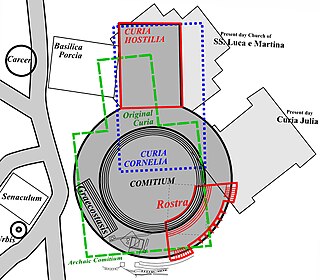Related Research Articles
80s BC is the time period from 89 BC – 80 BC.

Lucius Cornelius Sulla Felix, commonly known as Sulla, was a Roman general and statesman. He won the first major civil war in Roman history and became the first man of the Republic to seize power through force.
Gnaeus Pompeius Strabo was a Roman general and politician, who served as consul in 89 BC. He is often referred to in English as Pompey Strabo, to distinguish him from his son, the famous Pompey the Great, or from Strabo the geographer.
Aemilia Lepida is a Latin feminine given name that was given to the daughters of various Aemilius Lepiduses, men belonging to the Lepidus branch of the Aemilia gens (family) that was founded by the Marcus Aemilius Lepidus who served as consul in 285 BC. The Aemila Lepidas who appear in Roman historians were principally known for their engagements and marriages, with those in the late Republic and early Empire related to the Julio-Claudian dynasty.
Cornelia Sulla or Cornelia Silla was the eldest daughter of the Roman statesman and general Lucius Cornelius Sulla and his first wife Julia.
Publius Cornelius Sulla was a politician of the late Roman Republic and the nephew of Lucius Cornelius Sulla. He was also a brother-in-law of Pompey, having married his sister Pompeia.

Hiempsal II was king of Numidia from 88 – 60 BC. He was the son of Gauda, half-brother of Jugurtha, and was the father of Juba I.
Appius Claudius Pulcher was a Roman noble, general and politician of the 1st century BC. He was the father of a number of renowned Romans, most notable: the infamous Clodius and Clodia.
Faustus Cornelius Sulla was a politician of the Roman Republic. He was the son of the dictator Lucius Cornelius Sulla. He spent most of his career in the shadow of his father-in-law Pompey, whom he followed during the Civil War against Julius Caesar. He was killed soon after the battle of Thapsus in 46 BC.

The gens Cornelia was one of the greatest patrician houses at ancient Rome. For more than seven hundred years, from the early decades of the Republic to the third century AD, the Cornelii produced more eminent statesmen and generals than any other gens. At least seventy-five consuls under the Republic were members of this family, beginning with Servius Cornelius Maluginensis in 485 BC. Together with the Aemilii, Claudii, Fabii, Manlii, and Valerii, the Cornelii were almost certainly numbered among the gentes maiores, the most important and powerful families of Rome, who for centuries dominated the Republican magistracies. All of the major branches of the Cornelian gens were patrician, but there were also plebeian Cornelii, at least some of whom were descended from freedmen.
Lucius Cornelius Sulla was a Roman senator of the Augustan age. He was ordinary consul as the colleague of Augustus in 5 BC. The only other office attested for him was as a member of the Septemviri epulonum, which he was co-opted into after his praetorship.

Aurelia was the mother of the Roman general and statesman Julius Caesar.
Publius Licinius Crassus was a member of the respected and prominent Crassi branch of the plebeian gens Licinia as well as the father of the famous triumvir Marcus Licinius Crassus. His father was Marcus Licinius Crassus Agelastus and his brother Marcus Licinius Crassus served as a praetor in 107 BC.
Lucius Julius Caesar was a Roman statesman and general of the late 2nd and early 1st centuries BC. He was involved in the downfall of the plebeian tribune Lucius Appuleius Saturninus in 100 BC. He was consul of the Roman Republic in 90 BC during the Social War. During the war he commanded several Roman legions against the Italian Allies. He was awarded a Triumph for his victories on the Samnites at Acerrae.

Lucius Cornelius Scipio Asiaticus was a great-grandson of Lucius Cornelius Scipio Asiaticus, consul in 190 BC, who was victor of the Battle of Magnesia.

The Curia Cornelia was a place where the Roman Senate assembled beginning c. 52 BC. It was the largest of all the Curiae built in Rome. Its construction took over a great deal of the traditional comitium space and brought the senate building into a commanding location within the Roman Forum as a whole. It was the Senate House of the time of Julius Caesar and is significant because its location was moved by him to diminish the Senate's dominance within the City and Republic.
Lucius Manlius Torquatus was a consul of the Roman Republic in 65 BC, elected after the condemnation of Publius Cornelius Sulla and Publius Autronius Paetus.

The gens Caecilia was a plebeian family at ancient Rome. Members of this gens are mentioned in history as early as the fifth century BC, but the first of the Caecilii who obtained the consulship was Lucius Caecilius Metellus Denter, in 284 BC. The Caecilii Metelli were one of the most powerful families of the late Republic, from the decades before the First Punic War down to the time of Augustus.
Publius Cornelius Rufinus was a Roman politician and general of the third century BC.
References
- ↑ Keaveney, Arthur (2005). Sulla, the last republican (2nd ed.). London: Routledge. p. 6. ISBN 0-415-33660-0. OCLC 56421914.
- ↑ Smith, William (1870). Dictionary of Greek and Roman biography and mythology. Vol. 3. Boston, Little. p. 933.